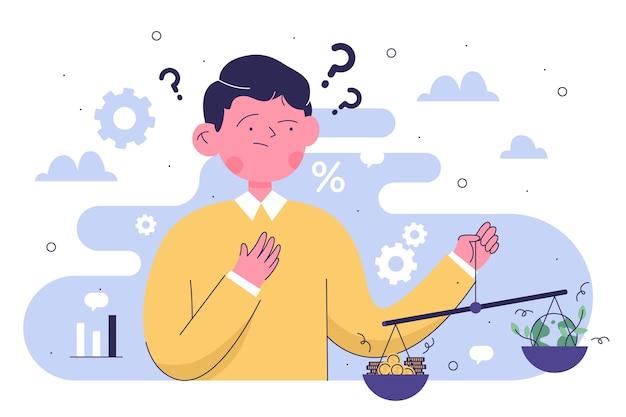In today’s fast-paced and interconnected world, navigating workplace ethics can be a challenging endeavor. As employees, we strive to make decisions that align with our personal values and the expectations of society. However, ethical dilemmas often arise, putting us in difficult situations where the right course of action may not be clear-cut.
In this blog post, we will explore some real-life examples of ethical dilemmas in the workplace, shedding light on the complexities and intricacies that professionals encounter every day. By understanding these scenarios, we can better equip ourselves to identify ethical issues, weigh the consequences of our actions, and make informed decisions. So, let’s dive into this exploration of workplace ethics and discover how to navigate the ethical minefield in an ever-evolving professional landscape.

What are some examples of ethical dilemmas in the workplace?
Ethical dilemmas are not uncommon in the workplace. In fact, they are an inevitable part of navigating the murky waters of professional life. While everyone’s moral compass may vary, certain situations often pose ethical challenges that can leave even the most principled individuals scratching their heads. Let’s take a closer look at a few examples of these workplace quandaries:
Honesty vs. Loyalty: The Case of the Office Gossip
Scenario: You stumble upon your colleague spreading juicy gossip about another coworker. You’re torn between outing the gossip or remaining loyal to your colleague.
Analysis: Should you confront the gossip-monger or let it slide? While loyalty is important in the workplace, it should never come at the cost of honesty. Gossips can create a toxic environment, erode trust, and hinder productivity. It’s best to approach the situation tactfully, reminding your colleague of the detrimental effects of spreading rumors.
Whistleblowing: To Speak or Not to Speak
Scenario: You discover that your employer is engaging in illegal practices that endanger public safety. You’re faced with the moral dilemma of reporting the misconduct or protecting your job and livelihood.
Analysis: Whistleblowing can be a daunting decision, but it is crucial to prioritize public welfare over personal interests. Before blowing the whistle, make sure you have concrete evidence, document everything, and seek legal advice to protect yourself. Remember, doing the right thing might be tough, but it can be immensely rewarding.
Conflicts of Interest: Balancing Personal and Professional Ties
Scenario: Your supervisor asks you to extend privileges to a close friend or family member that would be considered unethical or against company policy.
Analysis: While it’s tempting to use your position to help loved ones, it can create conflicts of interest and compromise your objectivity. To maintain fairness and integrity in the workplace, it is essential to be transparent about any personal relationships that may interfere with professional judgment. Politely decline such requests and suggest alternative solutions.
Ethical Dilemma: Favoritism in the Office
Scenario: Your boss consistently favors a particular employee, giving them better opportunities, promotions, and benefits while neglecting others who are equally or more deserving.
Analysis: Navigating favoritism can be challenging, especially when the one benefiting happens to be your boss’s pet. However, turning a blind eye to this ethical lapse can harm team morale, hinder growth, and breed resentment among employees. When addressing this issue, gather evidence, maintain objectivity, and consider discussing the matter with HR or higher-ups in a respectful way.
The Pressure to Bypass Regulations: Taking Shortcuts or Staying Ethical
Scenario: You’re working on a project with tight deadlines, and your supervisor suggests cutting corners or skirting regulations to meet the targets quickly.
Analysis: It’s easy to succumb to the pressure of meeting deadlines, especially when it comes from someone in authority. However, taking shortcuts can have severe consequences and compromise the organization’s reputation. Instead, propose alternative strategies to your supervisor that balance efficiency with ethical practices, ensuring the integrity of your work.
Ethical dilemmas are part and parcel of the complex nature of the working world. By recognizing and being prepared for these scenarios, you can navigate them with confidence, integrity, and a touch of humor. Remember, even in challenging situations, staying true to your principles will always pay dividends in the long run. Stay tuned for more insights on ethical dilemmas and how to tackle them head-on!

FAQ: Ethical Dilemmas in the Workplace
Welcome to our FAQ-style guide that answers common questions about ethical dilemmas in the workplace. In this section, we’ll discuss examples of ethical dilemmas, how to identify ethical issues, consequences of unethical behavior, and much more. So, buckle up and let’s dive right in!
What are some examples of ethics in daily life
Ethics are an integral part of our daily lives. Whether it’s choosing to be honest or treating others with respect, ethical behavior can be found everywhere. A few examples include:
- Being truthful with your friends, even when it’s not easy.
- Respecting your neighbor’s property and not trespassing.
- Keeping your promises to your family members.
Can you be fired for unethical behavior
Absolutely! Unethical behavior in the workplace can have severe consequences, including termination. Employers value trust, integrity, and a positive work environment. So, engaging in unethical behavior can put your job at risk. Remember, always strive to be ethical in both your personal and professional life.
How do you identify ethical issues
Identifying ethical issues requires a keen eye and a strong moral compass. Some ways to identify ethical issues include:
- Assessing whether an action is legal and morally acceptable.
- Evaluating the potential impact on stakeholders.
- Considering the long-term consequences of a choice.
By staying vigilant and attuned to ethical concerns, you can navigate through tricky situations with grace and integrity.
What are the consequences of unethical behavior
Unethical behavior can wreak havoc in the workplace. Some consequences include damaged professional relationships, loss of trust from colleagues, and a tarnished reputation. Additionally, unethical behavior can lead to legal issues, job loss, and even legal action. So, it’s crucial to think twice before engaging in anything unethical.
What are the 10 work ethics
Work ethics serve as a guide for maintaining professionalism and integrity in the workplace. The following are ten important work ethics:
- Reliability: Being dependable and fulfilling your commitments.
- Accountability: Taking responsibility for your actions and decisions.
- Honesty: Being truthful and transparent in all your dealings.
- Respect: Treating others with dignity and fairness.
- Punctuality: Arriving on time and meeting deadlines.
- Discipline: Staying focused and dedicated to your work.
- Teamwork: Collaborating effectively with colleagues.
- Adaptability: Embracing change and being open to new ideas.
- Professionalism: Maintaining a high standard of behavior and appearance.
- Ethical Decision Making: Making choices that align with moral values.
By embodying these work ethics, you’ll create a positive and thriving work environment.
What are some examples of unethical behavior
Ethical issues can manifest in various ways. Here are a few examples of unethical behavior in the workplace:
- Falsifying expense reports to receive undue reimbursements.
- Engaging in workplace gossip and spreading rumors.
- Discriminating against colleagues based on gender, race, or other factors.
- Taking credit for someone else’s ideas or work.
Remember, ethical behavior isn’t just a choice; it’s a reflection of your character.
What are the three general categories of unethical and illegal behavior
Unethical and illegal behavior can be broadly categorized into three main groups:
- Fraud: Engaging in deceptive practices for personal gain or to deceive others.
- Harassment: Subjecting others to unwanted and offensive behavior, such as bullying or discrimination.
- Conflict of Interest: Placing personal interests above the best interests of the organization or disregarding professional responsibilities.
It’s essential to steer clear of these categories to maintain ethical integrity in the workplace.
What are some ethical issues in society
Ethical issues in society encompass a wide range of topics. A few examples include:
- Environmental concerns, such as pollution and climate change.
- Social justice issues, like income inequality and human rights violations.
- Privacy concerns related to data collection and surveillance.
- Ethical considerations in biomedical research and technology.
Addressing these ethical issues requires collective awareness and action from individuals, organizations, and governments.
What is an example of something that is legal but unethical
While something may be legally permissible, it doesn’t necessarily mean it’s ethical. An example of this is tax avoidance. While companies may exploit legal loopholes to minimize their tax liabilities, it may be considered unethical as it lacks social responsibility. Remember, ethics go beyond legality and reflect the moral fabric of society.
What are some examples of ethical dilemmas in the workplace
Ethical dilemmas can present challenging situations in the workplace. Here are a few examples:
- Whistleblowing: Discovering unethical practices within your organization and deciding whether to report them.
- Conflicting Interests: Being torn between personal gain and the best interests of the organization.
- Confidentiality: Balancing the need for transparency with the protection of sensitive information.
Navigating these ethical dilemmas requires careful consideration and willingness to make difficult choices.
Why are unethical behaviors not illegal
While unethical behaviors may be morally wrong, they may not always be illegal due to varying legal standards and interpretations. Legal frameworks primarily focus on the fundamentals needed to maintain a functioning society. However, ethical standards often surpass legal requirements, serving as a guide for desirable behavior that promotes fairness and integrity.
What are the reasons for unethical behavior
Unethical behavior can stem from a variety of factors, including:
- Financial pressure: When individuals prioritize personal gain over ethical considerations.
- Lack of accountability: When there are no consequences or enforcement mechanisms in place.
- Lack of awareness: When individuals are unaware of the ethical implications of their actions.
- Organizational culture: When a company’s values and practices encourage unethical behavior.
Understanding these reasons can help address and mitigate unethical behavior within the workplace.
How do you deal with unethical situation and examples
Dealing with unethical situations requires a thoughtful and proactive approach. Here’s what you can do:
- Assess the situation: Gather all relevant information and evaluate the potential ethical violation.
- Seek guidance: Consult with a trusted colleague, supervisor, or ethics hotline for advice.
- Document the incident: Maintain a record of the unethical behavior, including dates, times, and individuals involved.
- Follow proper channels: Report the incident to the appropriate authority within your organization or legal jurisdiction.
- Maintain confidentiality: Handle the matter discreetly and refrain from discussing it with uninvolved parties.
Remember, taking action against unethical behavior contributes to a healthier work environment and upholds ethical standards.
In what circumstances do ethical dilemmas develop
Ethical dilemmas can develop in various circumstances, including:
- Conflicting values: When individuals or groups hold differing moral beliefs or priorities.
- Complex decision-making: When choices involve multiple stakeholders with competing interests.
- Ambiguous situations: When there is no clear-cut right or wrong answer.
- Resource constraints: When limited resources necessitate difficult choices.
Ethical dilemmas require careful evaluation and moral reflection to arrive at a principled decision.
What are some examples of ethical dilemmas in healthcare
The healthcare industry often faces intricate ethical dilemmas. Here are a few examples:
- End-of-Life Decisions: Determining whether to continue life support for terminally ill patients or respect their wish for a peaceful death.
- Confidentiality: Balancing patient privacy concerns with the need to disclose relevant medical information to ensure effective treatment.
- Allocation of Scarce Resources: Deciding how to distribute limited medical resources, such as organs or vaccines, in a fair and ethical manner.
Addressing these ethical dilemmas in healthcare requires a strong ethical framework and a focus on patient well-being.
Ethical dilemmas can arise in various aspects of our lives, including the workplace. By understanding ethical issues, adopting the right work ethics, and proactively dealing with unethical situations, we can navigate these complex situations with integrity. Remember, ethical behavior isn’t just a requirement—it’s a conscious choice to do what’s right. Stay ethical, stay awesome!
Disclaimer: This blog post provides general information only and should not be construed as professional advice. If you require legal or ethical guidance, please consult with a qualified professional.
